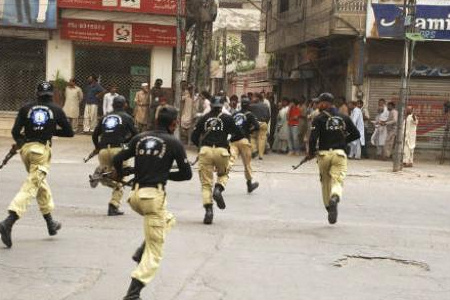 | 5th September 2011 PRESS RELEASE |
Another Ahmadi Muslim killed in Pakistan
Naseem Ahmad Butt (55), was martyred in Faisalabad
It is with great sadness that the Ahmadiyya Muslim Jamaat hereby confirms that on 4 September 2011, a well-known and respected Ahmadi Muslim, Mr Naseem Ahmad Butt (55), was martyred in Faisalabad, Pakistan.
Naseem Ahmad Butt was sleeping in his home in Muzzaffar Colony, Faisalabad when four unknown assailants jumped over the wall of his home and fired at him. He was shot in his stomach and chest. The assailants immediately fled the scene.
Naseem Ahmad Butt was left critically injured and was taken to hospital. Despite attempts to revive him, he passed away at approximately 9am local time.
Naseem Ahmad Butt was a peaceful and law abiding citizen who was kind and generous to all. He served the Ahmadiyya Muslim Jamaat with great distinction throughout his life.
He is survived by his wife, four daughters and one son. He has been buried at Bahishti Maqbara, Rabwah.
The Press Spokesman of the Ahmadiyya Muslim Jamaat, Abid Khan said:
This latest murder continues the trend of Ahmadi Muslims being targeted in Faisalabad. One year ago, a cousin of the deceased, Mr Naseer Ahmad Butt was also martyred in a brutal and barbaric fashion. Furthermore, recently leaflets were openly distributed in the city, stating that the killing of Ahmadi Muslims was worthy of praise and would be rewarded by God. These leaflets contained the names and addresses of various Ahmadi Muslims and it seems that this latest killing was likely motivated by such hate propaganda.
The International Community, Media and Human Rights organisations are all urged to take action to safeguard the basic human and civil rights of Ahmadi Muslims both in Pakistan and in other countries where they face discrimination. In an era where freedom of religion and belief is accepted as a basic human right throughout the world it is of disbelief that anti-Ahmadiyya legislation is still active and indeed still being enforced in Pakistan. If such hatred and sectarianism is allowed to continue then it is inevitable that further tragedies will occur.
Naseem Ahmad Butt was sleeping in his home in Muzzaffar Colony, Faisalabad when four unknown assailants jumped over the wall of his home and fired at him. He was shot in his stomach and chest. The assailants immediately fled the scene.
Naseem Ahmad Butt was left critically injured and was taken to hospital. Despite attempts to revive him, he passed away at approximately 9am local time.
Naseem Ahmad Butt was a peaceful and law abiding citizen who was kind and generous to all. He served the Ahmadiyya Muslim Jamaat with great distinction throughout his life.
He is survived by his wife, four daughters and one son. He has been buried at Bahishti Maqbara, Rabwah.
The Press Spokesman of the Ahmadiyya Muslim Jamaat, Abid Khan said:
“The religious extremists within Pakistan have taken yet another innocent life. What they perhaps fail to realise is that through their actions they are harming the entire peace and stability of Pakistan as a whole. Hatred and persecution of any organisation or group must be condemned by all those who believe in tolerance and love for humanity. Such attacks serve only to destabilise society and to spread discord”
This latest murder continues the trend of Ahmadi Muslims being targeted in Faisalabad. One year ago, a cousin of the deceased, Mr Naseer Ahmad Butt was also martyred in a brutal and barbaric fashion. Furthermore, recently leaflets were openly distributed in the city, stating that the killing of Ahmadi Muslims was worthy of praise and would be rewarded by God. These leaflets contained the names and addresses of various Ahmadi Muslims and it seems that this latest killing was likely motivated by such hate propaganda.
The International Community, Media and Human Rights organisations are all urged to take action to safeguard the basic human and civil rights of Ahmadi Muslims both in Pakistan and in other countries where they face discrimination. In an era where freedom of religion and belief is accepted as a basic human right throughout the world it is of disbelief that anti-Ahmadiyya legislation is still active and indeed still being enforced in Pakistan. If such hatred and sectarianism is allowed to continue then it is inevitable that further tragedies will occur.
22 Deer Park Road, London, SW19 3TL UK
Tel/Fax: 020 8544 7613 Mob: 077954 90682
Email: press @ ahmadiyya.org.uk
Press Secretary AMJ International
Tel/Fax: 020 8544 7613 Mob: 077954 90682
Email: press @ ahmadiyya.org.uk
Press Secretary AMJ International

 by Sonya Rehman
by Sonya Rehman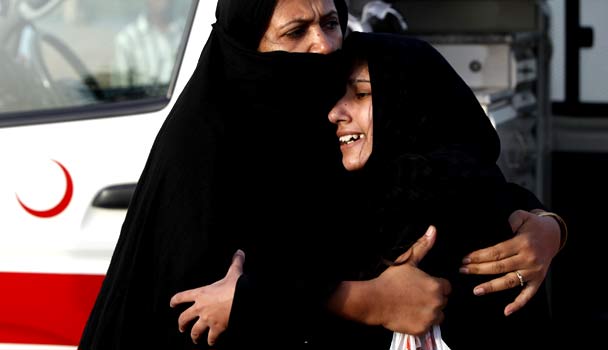



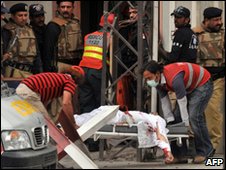
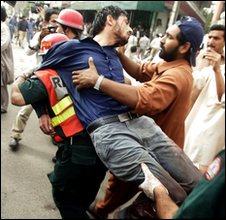
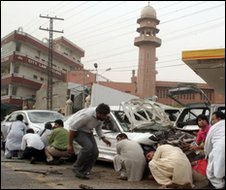


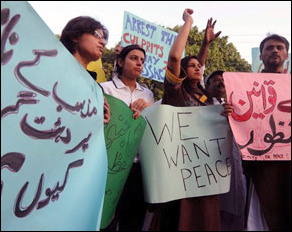 Life in the neighbourhood, where two Ahmedi places of worship in Lahore were attacked by terrorists on May 28, goes on but under a shadow of fear.
Life in the neighbourhood, where two Ahmedi places of worship in Lahore were attacked by terrorists on May 28, goes on but under a shadow of fear.










